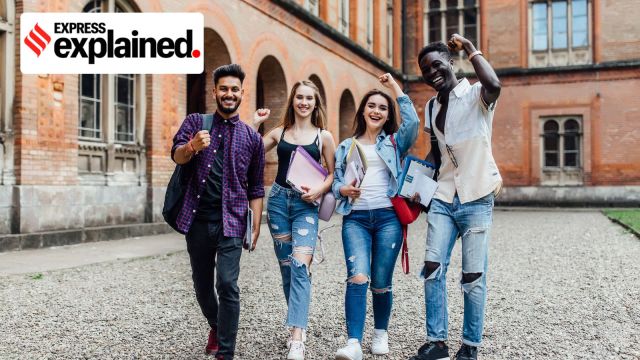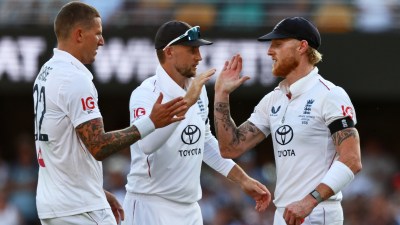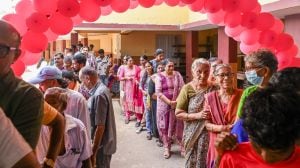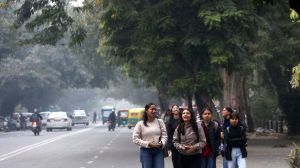After H-1B visa, protests in the US over OPT: What is this programme used by Indian students
The OPT programme allows international students in the US to secure work on a temporary basis and serves as a gateway for skilled professionals seeking the H-1B visa. We explain how, and why it is facing controversy.
 The OPT programme authorises international students, who are in the US on an F-1 visa, to work for up to 12 months in an area “directly related” to their major area of study, according to US Citizenship and Immigration Services (USCIS). (Photo - Freepik)
The OPT programme authorises international students, who are in the US on an F-1 visa, to work for up to 12 months in an area “directly related” to their major area of study, according to US Citizenship and Immigration Services (USCIS). (Photo - Freepik)Supporters of US President-elect Donald Trump’s ‘Make America Great Again’ (MAGA) idea have turned their ire on the Optional Practical Training (OPT) programme, considered a gateway for international students seeking an H-1B visa.
The OPT programme allows international students in the US to secure work on a temporary basis. This makes them better candidates for the H-1B visa, which allows skilled foreign nationals to be employed in the US for another six years.
OPT is a popular program among international students in the US, and Indian students now make up the largest international cohort in the country.
What is the OPT programme?
The OPT programme authorises international students, who are in the US on an F-1 visa, to work for up to 12 months in an area “directly related” to their major area of study, according to US Citizenship and Immigration Services (USCIS). International students who are enrolled full-time for at least one academic year in the US can apply for OPT.
This could be pre-completion OPT, which means that the student can work before completing their studies, or post-completion OPT, which authorises the student to work after completing their studies. A pre-completion OPT allows the student to work up to 20 hours a week while the academic session is underway, and full-time when the session is not. A post-completion OPT requires the student to work at least 20 hours a week or full-time.
Students who have obtained a degree in Science, Technology, Engineering and Mathematics (STEM) can extend their post-completion OPT by another 24 months. This means that they can work in the US for a total of three years. USCIS lists degree programmes that are eligible for this extension.
The academic institution where the student is enrolled can recommend them for the OPT, and the student can then apply to the USCIS for the programme. Those authorised to work under OPT remain under F-1 visa status.
How many students are part of the OPT programme in the US?
The 2023-24 Open Doors data shows that of the 8.83 lakh international students in the US, 2.42 lakh (27.47%) were in the OPT programme.
| YEAR | Total Students | UG | PG | Non-Degree | OPT | Other |
| 2000/01 | 54,664 | 22.40% | 72.80% | 0.00% | 0.00% | 4.80% |
| 2001/02 | 66,836 | 21.40% | 74.40% | 0.00% | 0.00% | 4.20% |
| 2002/03 | 74,602 | 18.50% | 78.20% | 0.00% | 0.00% | 3.30% |
| 2003/04 | 79,736 | 17.00% | 79.00% | 0.00% | 0.00% | 4.00% |
| 2004/05 | 80,466 | 20.40% | 72.10% | 0.00% | 0.00% | 7.50% |
| 2005/06 | 76,503 | 16.60% | 73.70% | 0.00% | 0.00% | 9.60% |
| 2006/07 | 83,833 | 15.00% | 71.10% | 1.20% | 12.80% | 0.00% |
| 2007/08 | 94,563 | 14.40% | 72.00% | 2.10% | 11.50% | 0.00% |
| 2008/09 | 103,260 | 15.10% | 68.80% | 1.70% | 14.40% | 0.00% |
| 2009/10 | 104,897 | 14.50% | 65.10% | 1.70% | 18.70% | 0.00% |
| 2010/11 | 103,895 | 13.50% | 61.20% | 1.50% | 23.70% | 0.00% |
| 2011/12 | 100,270 | 13.00% | 58.90% | 1.50% | 26.70% | 0.00% |
| 2012/13 | 96,754 | 13.20% | 56.40% | 1.60% | 28.80% | 0.00% |
| 2013/14 | 102,673 | 12.30% | 59.50% | 1.20% | 27.00% | 0.00% |
| 2014/15 | 132,888 | 12.40% | 64.00% | 1.40% | 22.10% | 0.00% |
| 2015/16 | 165,918 | 11.60% | 61.40% | 1.50% | 25.50% | 0.00% |
| 2016/17 | 186,267 | 11.80% | 56.30% | 1.20% | 30.70% | 0.00% |
| 2017/18 | 196,271 | 11.90% | 48.70% | 1.00% | 38.40% | 0.00% |
| 2018/19 | 202,014 | 12.30% | 44.70% | 1.10% | 41.90% | 0.00% |
| 2019/20 | 193,124 | 13.00% | 44.10% | 0.90% | 42.00% | 0.00% |
| 2020/21 | 167,582 | 14.20% | 41.10% | 0.80% | 43.90% | 0.00% |
| 2021/22 | 199,182 | 13.80% | 51.20% | 0.70% | 34.20% | 0.00% |
| 2022/23 | 2,68,923 | 11.80% | 61.70% | 0.70% | 25.68% | |
| 2023/24 | 3,31,602 | 10.87% | 59.30% | 0.43% | 29.42% |
While the largest chunk of Indian students in the US is pursuing postgraduate courses, an increasing number of Indian students have chosen OPT in the past few years. In 2023-24, of the 3.31 lakh Indian students in the US, 97,556 students (29.42%) were in the OPT programme. This is an uptick compared to 69,062 students in 2022-23, and 68,188 students in 2021-22.
The STEM courses, which allow students to obtain a 24-month OPT extension, remain the most popular among Indian students in the US – of the 3.31 lakh Indian students in the US in 2023-24, 24.5% were pursuing engineering, while 42.9% were pursuing maths or computer science.
Why have MAGA supporters opposed the OPT programme?
Their argument against OPT, particularly the extension for STEM graduates, is that it takes jobs away from American citizens.
In 2023, WashTech (Washington Alliance of Technology Workers) petitioned the US Supreme Court in a case challenging the validity of the STEM OPT. The Supreme Court then rejected their appeal to review the ruling of a circuit court, which had earlier upheld the validity of the programme.
The Obama administration had increased the STEM OPT extension to 36 months from 29 months.
- 01
- 02
- 03
- 04
- 05






































